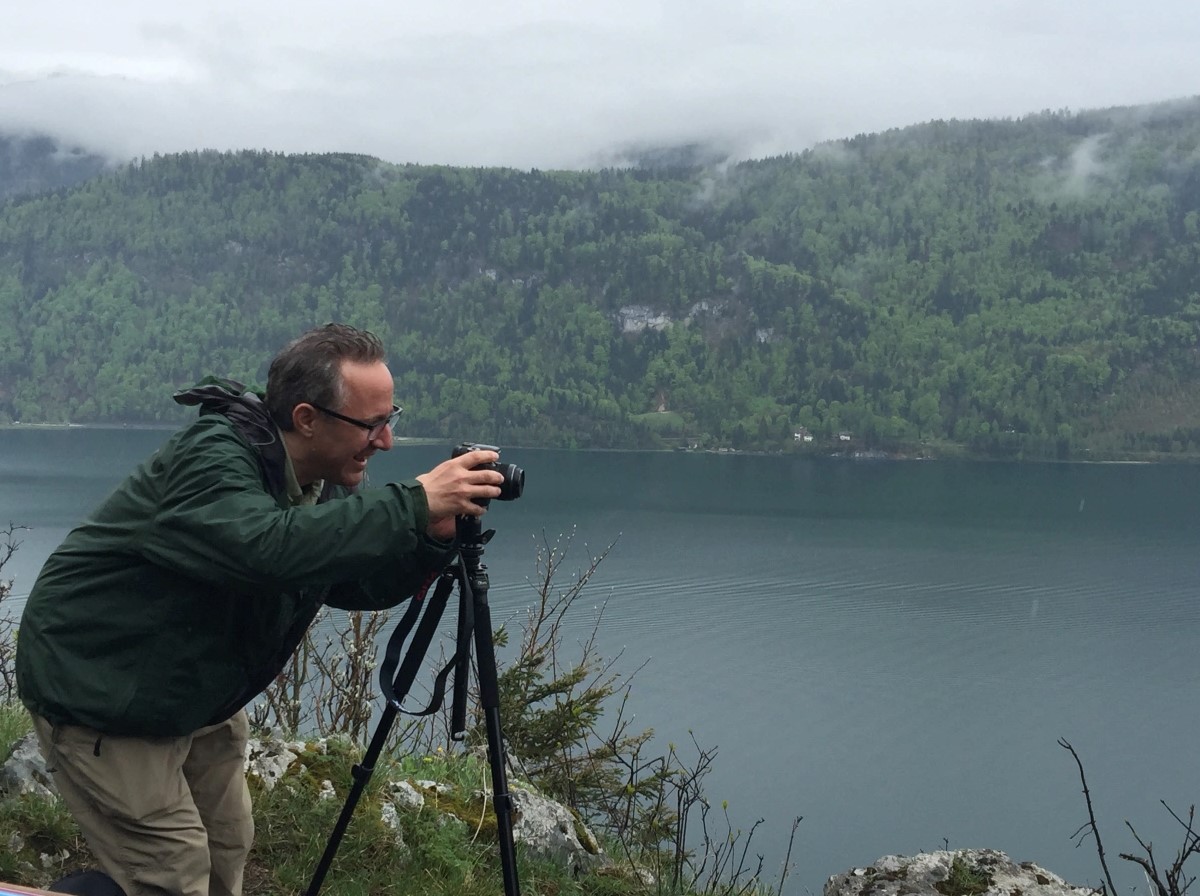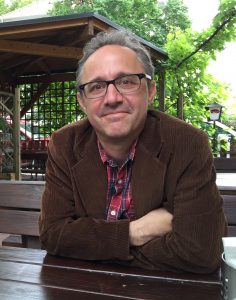What is your BIAAS-supported project about?
I’m creating a series of documentary videos and podcasts that will examine the Austrian mountain rescue service from the perspective of social and political philosophy. I’ll compare and contrast the Bergrettung with its sister services in the United States to understand how they embody ideas about society that, when consciously understood, could be a resource for sustaining liberal democracies in times of stress. The Bergrettung is a civil society institution whose history and daily practices may have much to teach the world about self-governance, social trust, civic solidarity, and the mitigation of risk in a free society. I’ll be based in the Department of Legal Philosophy at the University of Salzburg, under the leadership of Univ.-Prof. Dr. Stephan Kirste, and from there I’ll be venturing out across the country to speak with members of the mountain rescue service in all four seasons. As I conduct my research, I’ll be sending dispatches into the digital world in preparation for a larger video production. The study forms the inaugural chapter of a broader multimedia series to be undertaken by my video production company, Hidden Cabinet Films, called “Tending the Wounded: A Social and Political Theory of Emergency Medical Services.”
How did you become interested in this project?
After teaching constitutional law and writing books about history and social theory for a little over a decade, I began to experiment with documentary video essays as a way to explore legal ideas (here’s an early example). When I was a Fulbright scholar at the University of Salzburg in 2015, I had the quixotic idea of making a film about the jurisprudence of the great Austrian legal theorist Hans Kelsen, who immigrated to America in 1940. As even Kelsen’s most ardent enthusiasts would (and frequently did) admit, his ideas provide a subject uniquely ill-suited to treatment on film. For me, alas (alas?), such a challenge is like catnip. I began to think about ways to approach the topic in a cinematic way, and this led me to create a series of videos about the relation between Austrian ideas of law and the Austrian experience of landscape. I called the project “Wood, Water, Stone, Sky, Milk.” At the time, I was also teaching a course in Salzburg about the treatment of law in American film. As I was preparing to return home, I discussed the project on radio ORF.
In the course of this work, I interviewed an archivist for the Salzburg folk music archive who also volunteers for his local mountain rescue service. I was especially interested in his story, because shortly before coming to Austria I had begun to receive training in wilderness medicine in New Hampshire, which eventually led me to be certified as a Wilderness Emergency Medical Technician. The video essay I created through our conversations can be viewed here.

Mark Weiner
This conversation got me thinking … and the more I considered it, the more I came to appreciate how important the mountain rescue service is to Austrian identity, and how it forms a “condition of possibility” for the special type of liberal society that Austrians have created. I began to think about parallel rescue services in the U.S. and the communities they serve. Hmmm, I thought, something here is worth pursuing!
Also, of course I’m a big fan of the television series “Bergretter”!
I should add that I come from a family that has been engaged with Austria for some time, and that experience lies in the deep background of how I became interested in this subject. My mother is the editor of the philosophical notebooks of Austrian émigré psychologist Fritz Heider, and my father’s work follows in his scientific tradition.
What is the significance of the transatlantic history between the US and Austria in your work? And, if this pertains to your work, how does looking at the transatlantic relationship enrich your research subject?
I don’t want to prejudge this aspect of the project, but it’s a central concern both historically and conceptually. My intuition, based on some reading, is that mountain rescue services in the United States developed in part under the influence of Austrians, especially as the west opened increasingly to tourism. This is part of the story of the development of the rescue services in Canada. I’d like to understand this more deeply. Yet even more, I’d like to understand the similarities and differences between the ideas about mountain rescue services in Austria and the U.S. Do those ideas reveal divergent underlying social and political philosophies?
How is the Covid-19 pandemic affecting your work? Or, how are you advancing your research in light of the challenges of the pandemic?
I wish I could say that Covid didn’t completely upend my plans—but, well, it completely upended my plans! My project requires travel to Austria, and it also demands that people feel comfortable enough to sit down with me for extended periods and talk without a mask. I tried to make an argument to the Austrian consulate in New York that I could be deemed a medical researcher based on the fact that I hold an Emergency Medical Technician license and that I therefore could be allowed into Austria under an exception to the promulgated travel restrictions—but the very kind and helpful, yet firm Austrian official just smiled and very reasonably told me no. But one makes the best of it! I’ve been doing what I can to prepare for the uncertain date when I can travel by reading and trying to raise further financial support for the project. I also wrote a background article on EMS and social theory now forthcoming in the journal Telos. At the same time, precisely because of the pandemic it seems to me more important than ever to think about first-responder medical services from a social and political perspective.
What books are a must-read for your topic?
I appreciate that this will sound like I’m kidding, but Hegel’s The Phenomenology of Spirit and Heidegger’s Being in Time. I’m also deeply interested in the sociological literature on social and political trust. There’s a helpful handbook put out by Oxford on the subject that contains a review of the field. On the subject of the Bergrettung itself, lately I’ve enjoyed Walter Spitzenstätter’s Ehrensache Leben Retten: Die Geschichte der Bergrettung Tirol.
What is a high point of your research experience with this project? Any low points?
Well, to be honest, the low point came gradually as I realized that there was no way that I would be able to travel to Austria in 2020. Two high points came when a legal philosopher in Vienna with whom I was corresponding wrote to express his enthusiasm for the idea, and when I was emailing with a representative of the Bergrettung and without prompting she offered to put me in touch with the head of the organization—these were very encouraging moments that confirmed that I was onto something and that I’d be able to pursue the project once circumstances permitted.
What is your favorite least-known locale of the Austria/Habsburg lands?
When I was a Fulbrighter, my wife and I made a commitment not to leave Austria during our eight-month stay if we could help it, so we had the chance to see a good deal of the country. There are so many places that we enjoy, and that are particularly meaningful for us, and I suppose some of these aren’t especially well known. (The most special surely would be the lakes of the Salzkammergut, but these are famous, among other things from “The Sound of Music,” and the Esterházykeller, and the beautiful castle of Innsbruck, and, and, and…). Three of the most pleasant days we spent in the country were in Weisenkirchen in der Wachau as part of a bicycle trip down the Danube (during which we became firmly converted to the aesthetic of the baroque by admiring the lesser-known monasteries along the route). We have often talked of returning there to enjoy a glass of white wine while looking out over the river. We likewise spent a wonderful few days in Mariapfarr, in Lungau, which I believe few people visit.
But I’ll share a story about a place that isn’t especially grand, yet which for just that reason has come for us to symbolize something about Austria that we find very special: the small town of Golling near Hallein, and in particular a hotel there called the Hauslwirt. Once on a multi-day bike trip that began with our cycling, to our surprise, through the snow in the mountains (that was a challenge!), we were caught in a bad storm that caused a great deal of damage along the Salzach River. The worst of it came when we were about half an hour from Golling—we were hoping to make it back to Salzburg, but we realized that trying to do so would be unwise. We pedaled into town absolutely soaking wet, and we rolled up hopefully to the hotel, which to our surprise had a room available. The manager was kind and courteous, and without making a big deal of things as we dripped all over his floor offered to dry our things and store our bicycles and set us up right—which he did, and before a few hours had passed we were enjoying a marvelous dinner in his restaurant. Schnitzel never tasted so good! We were so happy! Months later, when my wife and I were forced to interrupt a planned month-long hiking trip through the Tennengebirge midway through as a result of illness (we were on a high mountain peak when the illness kicked in, and getting down was quite dramatic!), we thought to ourselves: where can we go to recoup and feel at ease? We went to Golling, of course, and to the Hauslwirt—where we were remembered and put up in the same room where we had stayed before. We then sat at a table outside, eating lunch, watching the world go by. For us, this hospitality is Austria.
If you could meet with any Austrian/Habsburg figure of present or old, who would it be? Why? What would you want to ask them or talk about?
Well, there are some famous names that come immediately to mind. Would I be allowed to sit in silence behind Beethoven in Vienna and just listen to the scratch of his pen as he wrote his late string quartets? (I wouldn’t say a word, I promise, and I’ll bring a warm sweater.) How about Maria Theresa? I’d be fascinated to hear her reflect on her experience with legal reform. Or would Peter Lorre count? I’d love to hear him talk about acting. If I really had to choose among major historical figures, I’d probably say Stefan Zweig. I’d talk with him about the experience of historical time, and I’d give him a copy of Nabakov’s Speak, Memory and ask him what he thought.
On the other hand, I think I’d equally enjoy meeting unsung figures from the Austrian past, especially a beer brewer from a small town hundreds of years ago, or one of the masons who built the Esterházykeller in Vienna. I’d just ask them about their lives as we had lunch while sitting on a street corner or an old wooden bench.
(Ssshhhh …these choices all sound so serious! Couldn’t I just have a quiet dinner with Hedy Lamarr?)
What are you currently reading? Or watching?
My wife is currently teaching quite intensively at her university, Wesleyan (she is a scholar of nineteenth-century British poetry), and in the evening she’s tired, so we try to wind down the day by watching women’s basketball, of which we’re both big fans—in a way, it’s basketball the way it was supposed to be played, as a team sport (one could say the same of a healthy liberal society). A glass of wine helps. Grüner Veltliner, please.

